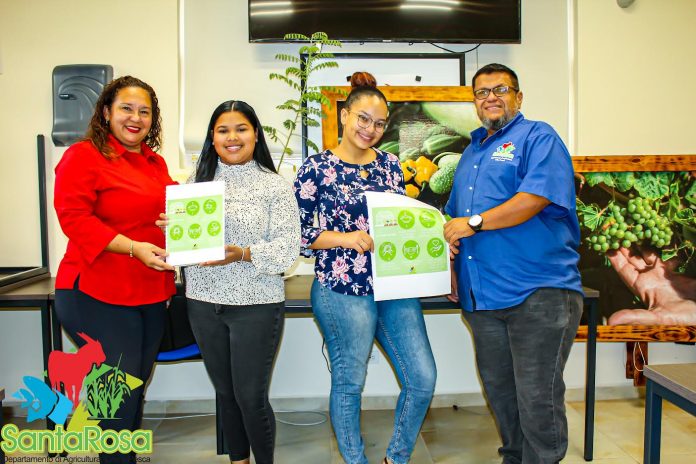Recently, University of Aruba students Taisha Henriquez and Zayliyah Danje presented the findings of their survey “Why are School gardens an added value to Aruba’s Food Security and Children’s wellbeing?”
The government’s main goal is to stimulate the primary sector in Aruba. Not only for food security but also to allow the youth to come in contact with this sector.
In 2019 the “Hofi di Amistad”, the project started with the objective to start school gardens (orchards) backed by a maintenance plan by the students. Currently, two participating schools allow for measuring the development and success of each one. This makes it possible to adjust the model into a more durable and practical format to reach the main goal and effectiveness of the gardens.
Many other schools want to create their school garden but encounter setbacks for different reasons. Some obstacles are the high irrigation or maintenance costs and the upkeep during the vacation seasons. Despite these obstacles, some schools are trying hard to establish a small garden for the children to enjoy.
Santa Rosa, the government department in charge of the primary sector, wants to evaluate this project to help develop a more sustainable plan to stimulate more school gardens in Aruban schools.
According to the Director of Santa Rosa, Mrs. Nathalie Maduro, each school garden is a valuable educational tool. It serves to create awareness and stimulate the youth about the importance of a country establishing healthy food security for its community. It can also become a professional career, lowering the dependency on imported food and further job creation.
In March 2022, Santa Rosa presented the research theme to the University of Aruba as part of a project for the students to assist with its execution. Two students were selected, Taisha Henriquez and Zayliyah Danje of the Social Works faculty, to initiate the research through a survey, in collaboration with the Santa Rosa, about the theme “Why are School Gardens an added value to Aruba’s Food Security and Children’s wellbeing?”
The students collected data for their research and visited the two existing school garden projects and other entities where Santa Rosa assisted with workshops and planting materials in the past.
Another essential aspect of the research is a survey sent to teachers, former teachers, parents, professionals, and department heads. The aim was to get a better view of how each of these groups sees the effectiveness of developing more school gardens and the possible impact these can have on the children’s health and development. Data shows that the teachers and the parents are more intrigued by this project and recognize the benefits of stimulating food cultivation from a young age.
However, there is a financial and commitment obstacles to maintaining these school gardens. There is now a better overview because of the research. Santa Rosa has a better perspective on the future school gardens and can work on the possible solutions to make each garden successful.
The students have created an informative poster illustrating the five characteristics that make school gardens a beneficial tool concerning the social, nutritional value as well as personal development of each child. Santa Rosa is grateful to Mrs. Yolanda Richardson, a teacher at the Research Methodology Introduction Module at the Art & Science Faculty of the University of Aruba for her cooperation. Santa Rosa is also very grateful to students Taisha Henriquez and Zayliyah Danje for their dedication in executing the research and presenting the report to Mrs. Nathalie Maduro in the presence of Mr. Ludwig Rasmijn, responsible for the school projects.
For more information, contact the Department of Agriculture, Livestock, and Fishery (Santa Rosa) at 5858102 or info@santarosa.aw
















